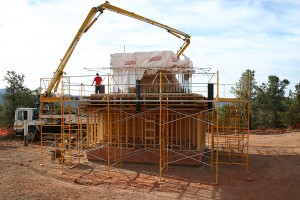The following is an excerpt from a teaching by Jetsunma Ahkon Lhamo called “Love Now, Dzogchen Later”
I have the great pleasure of watching the aviary building being built from my deck. How carefully these skilled workers laid the foundation. How carefully they smoothed the ground. How carefully they measured, so exacting, so perfectly, looking through instruments and laying strings and then putting in wood to mark the way, and then, you know, stage by stage, one bit of strength after the other. How skillfully, and now the walls are coming up. And these are very heavy walls made of concrete, but they are all built up to the top, and I think to myself, ‘If that firm foundation had not been built, since that land slopes right there and it is screaming wet all the time, guess what? That little building would just slide right off the edge; but not the way it’s built.’
And we find ourselves in the same position. I regret to tell you that I have seen time and time again students who have taken the Dzogchen teaching but have not accomplished Vajra qualities. They have not given rise to the bodhicitta. They may have put on the garb of renunciates, but they are not renunciates. They have not renounced the grasping of samsara. They have not stabilized their mind. So it’s like they are traveling the great ship of Dharma and even though the ship itself is fairly stable, it is on an ocean and it is going to rock and roll a little bit, you know? And it is like you’re the practitioner on roller skates who’s not holding on on top of a sheet of ice on the boat. It’s not going to work. You’re going to go overboard. And they do. They get thrown off. Whereas if we had taken time to practice properly with depth, not so superficially, taking responsibility for the accomplishment that you know in your heart has always been required of a proper disciple… And it’s not like it’s news to you. I’ve been yapping about this for years. So, in that case, maybe you would be more seaworthy. You’d have your sea legs. I’m pretty sure of it. You would be hanging onto a rail. You’d be properly equipped to travel this ship of Dharma to the other shore. And that would be like the seed of Dzogchen being planted in a field that is rich and fertile and moist.
So having given rise to the Bodhicitta, we would be different than we are. How would we be different? Would we look funny? I don’t know. We look funny now sometimes. I look funny. You should see me in the morning. That’s all silly stuff. How would you be different? I think better. To accomplish excellent qualities, to establish virtue in the mind stream, to give rise to the Bodhicitta? A lot better.
So the point is that you find yourself in a particular situation where you can go to New York every summer, and you can study, and you can sit down and practice for the rest of the year. But we do not find ourselves in the perfect situation where we are in a monastic environment constantly where the reality of Dharma is constantly reflected to us, where the method of Dharma is constantly reminded to us. where the way is constantly pointed out, and where our limited capabilities, you know, are constantly guided. It would be like a child growing up without the advice of a parent. It is not very effective. And the reason why I’m telling you this is not so you can go, ‘Oh bummer! Here I’ve had Dzogchen and now I find out it’s not happening,’ or something. That’s not what I’m saying. I hope you understand that. Dzogchen is the very nectar of Dharma. It is the distilled substance that is empty of substance-ness. It is awakening. It is the way to move towards realization. It is the way to give rise to one’s best capabilities. It is the way to accomplish the Buddha nature. But like any other method, if you do not accomplish the steps that lead to strengthen that method, you’ve missed out.











